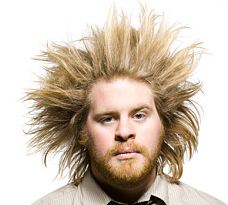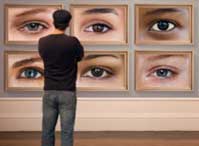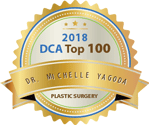
- Average number of hairs on the head: 100,000
- Average number of hairs on a natural red head of hair: 90,000
- Average number of hairs on a black head of hair: 110,000
- Average number of hairs on a blond head of hair: 140,000
- Hair covers the skin on the whole body, except the soles, palms, and lips.
- Maximum length of hair: 70 to 90 cm
- Average hair diameter is 0.1 mm
- Annual growth: 12 cm
- Average lifespan of the hair is 2-7 years.
- Contrary to popular belief, cutting hair does not influence its growth .
- However, hair is the fastest growing tissue in the body (witness the five o’clock shadow).
- Hair grows faster in warm weather because humidity stretches the hair (a benefit, to balance out the curse of the frizz!).
- Elderly people have slower hair growth and diminished hair density.
- Female hair grows more slowly than male hair. (Surprise!)
- Male hair is denser than female hair. (Surprise, again!)
- At any given moment, 90% of scalp hairs are growing and 10% are resting.
- It is normal to lose 100 hairs per day from the scalp.
- You must lose over 50% of your scalp hairs before it is apparent to anyone (roughly 50,000 hairs).
- Over 50% of men experience male pattern baldness by age 50.
- 40% of women will have female pattern hair loss by the time they reach menopause (shock!).
- Thyroid imbalance and iron deficiency are reversible causes for hair loss.
When Medications Are to Blame
1. What Types of Drugs Can Cause Hair Loss?
- Acne medications containing vitamin A (retinoids)
- Antibiotics and antifungal drugs
- Antidepressants
- Birth control pills
- Blood thinners/anticlotting drugs
- Chemotherapy drugs
- Cholesterol-lowering drugs
- Drugs that suppress the immune system, like steroids
- Drugs that treat breast cancer
- Epilepsy drugs (anticonvulsants)
- High blood pressure medications (anti-hypertensives), such as beta-blockers, ACE inhibitors, and diuretics
- Hormone replacement therapy
- Mood stabilizers
- Parkinson’s disease drugs
- Thyroid medications
- Weight loss drugs
2. How Is Drug-Induced Hair Loss Diagnosed?
a. The History – questions should include the following:
- When did the hair loss start?
- How quickly has the hair been falling out?
- What other symptoms do you have, such as scalp itching, burning, or tingling?
- What drugs were you taking in the four months leading up to the hair loss?
- What other illnesses do you have?
- Have you made any changes to your diet or hair care routine?
b. The Physical Examination – examination of the scalp to look at the pattern of hair loss.
c. The Tests – may include the following:
- Thyroid function tests to look for thyroid disorders, which can sometimes cause hair loss
- Hair shaft exam to look at the shape, length, and fragility of the hairs
- Pull test: gently pulling on about 100 hairs to see how many come out. (A normal result is one to three hairs.)
- Biopsy: removing a piece of scalp tissue for examination
- Hormone tests (DHEAs, testosterone, androstenedione, prolactin, follicular stimulating hormone, and leutinizing hormone)
- Serum iron, ferritin, total iron binding capacity
- Complete blood count and VDRL (screening test for syphilis)
- Densitometry – a handheld magnification device is used check for miniaturization of the hair shaft.
d. The Proof – it may be difficult to prove which drug is causing the hair loss, or even that a drug is to blame. Sometimes, you may be asked to stop taking one drug at a time to see whether hair loss stops, but it can take two to three months after stopping a drug for hair loss to end.
3. How Is Women’s Drug-Induced Hair Loss Treated?
It’s important to review any medications you take, and discuss their potential side effects with your doctor and pharmacist. When hair loss does occur from a drug you’re taking, there is a good chance that the hair will grow back on its own after you stop taking the medication. If stopping the drug does not improve hair thinning, you may need to be treated with prescription medications that slow hair loss and can stimulate new hair growth. Examples include Minoxidil 2%, spironolactone, cimetidine, cyproterone acetate (not legal in the USA), hormone replacement therapy, low androgen oral contraceptives, ketoconazole, and Propecia.
BeautyScoop<font-size=”8px”>®
If you desire voluminous, thicker-looking, shinier, fuller hair, try Dr. Yagoda’s patented, and scientifically and clinically proven nutritional beauty supplement, BeautyScoop®. BeautyScoop® is rich in essential peptides and lipids that are the necessary building blocks for healthy and beautiful hair. Its natural, allergen friendly formula, is made in the USA at an organic-certified factory. It enhances fuller, healthier existing hair growth and reduces shedding to optimize thicker, shinier, lustrous and voluminous hair.
BeautyScoop® delivers rapid, measurable and significant results that you can see and feel:
- 95% of users in clinical trials reported an improvement in their hair, skin and/or nails; 85% reported a noticeable improvement; 74% reported a great improvement; and, 21% reported that their problem was completely gone.
- After the FIRST week, 58% noticed an improvement in hair.
- After TWO WEEKS of use, 79% noticed an improvement in hair.
- After THREE WEEKS, 84% noticed an improvement in hair.
BeautyScoop® fortifies split ends and strengthens hair; it arouses and stimulates hair follicles to repair hair damage from harsh shampoos, dyes, colors and perms. It luminizes hair by locking moisture into the hair shaft to intensify shine and maximize manageability. It improves the appearance of thinning hair by enhancing thicker looking, shinier, fuller and healthy, long hair growth while conditioning and nourishing the scalp.
How does BeautyScoop® help dull, dry and brittle hair?
Cracked hair and split ends can occur with insufficient intake or absorption of dietary oils, and cause the hair to appear dull, dry, brittle and even dirty.. The essential lipids in the SPLs, lock moisture into the hair follicle to fortify split ends, strengthen the hair shaft, reduce breakage, intensify shine and maximize manageability.
The lipids in BeautyScoop® also nourish and condition the scalp. It revitalizes straightened, relaxed black hair. Together, this contributes to an improvement in luster and shine, and a reduction in the everyday hair loss that result in hair thinning. SPLs supply the necessary peptides and lipids required to promote existing healthy, long hair growth.
How does BeautyScoop® strengthen hair and reduce split ends?
Without adequate protein, growing hair strands won’t become as strong and resilient as they should be. Without lipids and essential fatty acids, hair may not be as shiny and manageable as it could be. BeautyScoop® provides critical peptides and lipids, the necessary building blocks for healthy and beautiful hair. Acting in combination with BeautyScoop®’s patented formula, these peptides and lipids work to reduce split ends and strengthen hair for rapid, visible results.
Can’t I get this from my regular diet?
Everyone knows that most dietary supplements and vitamins are to augment a diet that is lacking, But, BeautyScoop® was formulated specifically for those people who, in spite of eating a healthy diet, still have problems in the skin, hair and nails. These people’s problems were found to be a result of inadequate absorption of the peptides and lipids that are the necessary building blocks for healthy and beautiful skin, hair and nails. And, according to the Centers for Disease Control, up to 33% of people have problems with absorption.


































